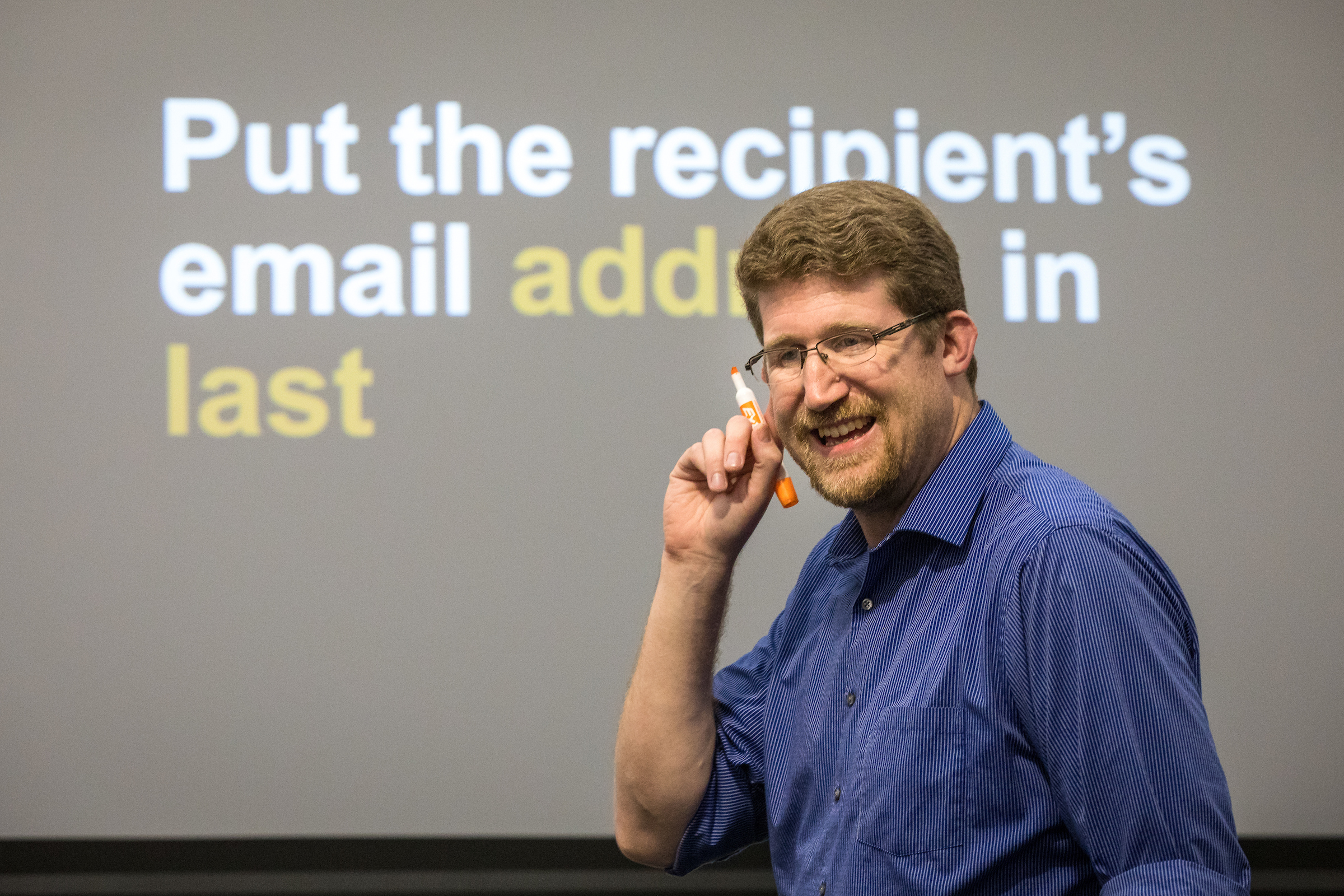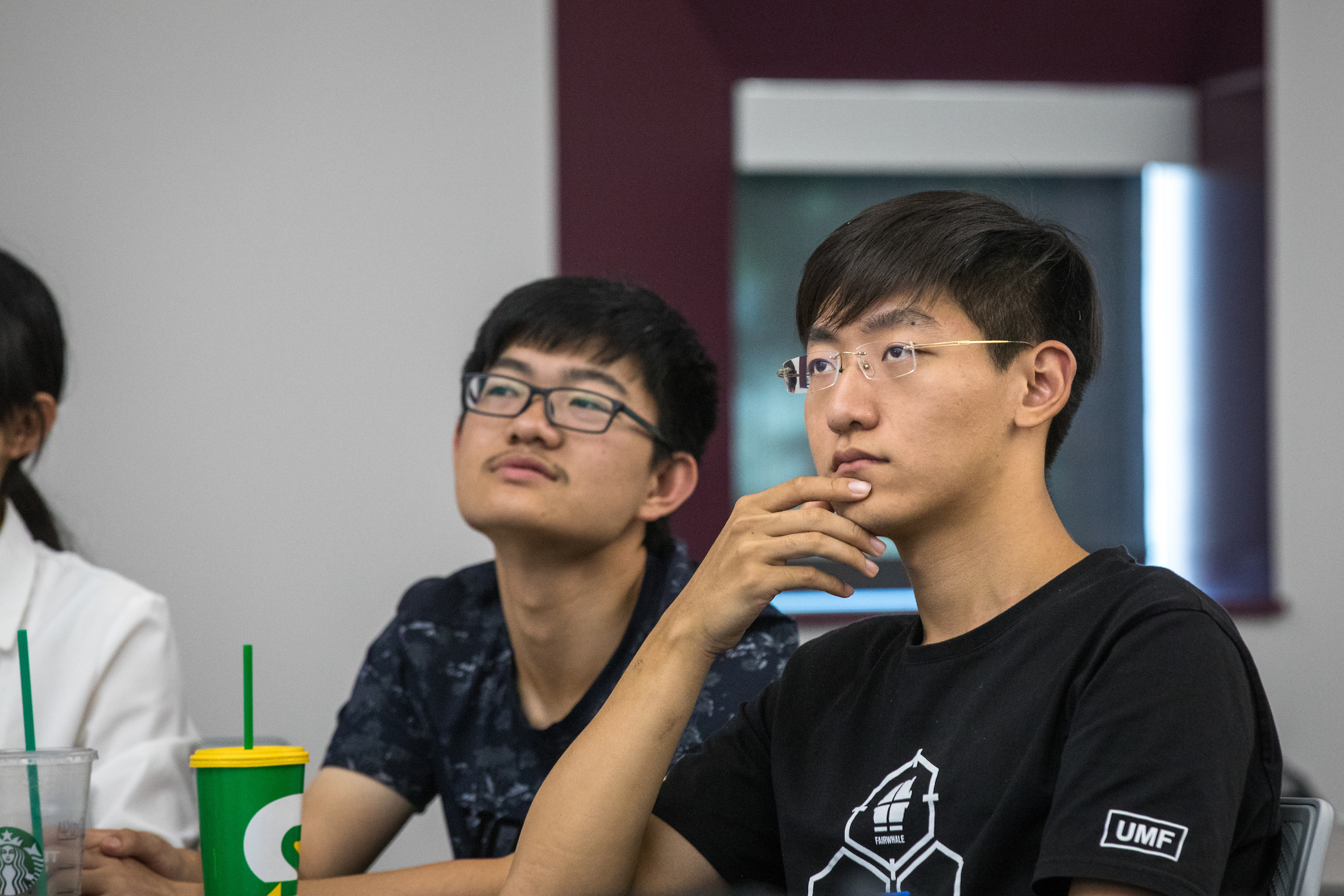Twenty young Chinese people enthusiastically raised their hands when the teacher asked if they used the social app WeChat.
Too bad, he told them.
“The people in America that you’re going to want as resources — networkers, investors — are going to use email,” said Bob Schoenfeld, executive liaison for international student services at the W. P. Carey School of Business at Arizona State University.
“Email is the primary form of communication, and the way you use it is incredibly important.”
Email etiquette was just one part of American business culture that the young people, all students at Sichuan University, were learning during an intensive two-week program on entrepreneurship at ASU’s Tempe campus. They were in the first cohort of “Global Innovators,” sponsored by the W. P. Carey School of Business in partnership with the Entrepreneurship + Innovation unit of Knowledge Enterprise Development at ASU.
Bob Schoenfeld, executive liaison for international student services at the W. P. Carey School of Business, teaches English and American business culture. Photo by Charlie Leight/ASU Now
ASU has had a partnership for several years with Sichuan University, which recently received funding from the central government in China to build a program in entrepreneurship and innovation, according to Angela Zhou, senior project manager at ASU. The program funded most of the 20 students who are at ASU this month.
“Systemically, entrepreneurship has not been approached in China the way we do here today,” she said.
The Chinese are known as a manufacturing powerhouse, “but they want to innovate and have their own ideas,” Zhao said.
Shan He (pictured at the top of this story), an English language and literature major at Sichuan University, wanted to take the course to learn more about the practice of entrepreneurship.
“Chinese people think, ‘I have an idea and I’ll start this business,’ but without a specific methodology, they can fail really fast even if the idea is great,” said He, who worked at an English-lesson startup for two years.
“I know Americans have done this for a longer time and have already built a culture of doing this. I would like to do consulting to promote this culture and creativity in China to help startups,” she said.
Renguang Liu is a mechanical engineering major at Sichuan University.
“I’m interested in how to make technology help people to live a better life, and I don’t think my classmates or my teachers in China think about those things,” he said. “So I wanted a new environment to make some creative ideas.”
The students come from a variety of majors, including engineering, business and dentistry. They’ll have follow-up sessions online, and in the fall, Schoenfeld and ASU lecturer Rhett Trujillo will travel to Sichuan University for the group’s final presentations. Trujillo designed the entrepreneurship content in the program, which could possibly expand to other universities in other countries.
“Global Innovators” includes lessons on entrepreneurship, such as how to take an idea from concept to reality, as well as classes on business English and American culture.
Shuwen Xiao, a nursing major at Sichuan University, attends a class in the new "Global Innovators" program for aspiring entrepreneurs. Photo by Charlie Leight/ASU Now
The cultural awareness covered the “whys,” said Schoenfeld, who designed that content.
“There’s a reason why we do what we do,” he said. “It’s not good or bad or better or worse, it’s just different.”
One example is the American value of punctuality.
“In America and Western Europe, there are deadlines. Time is money,” he said. “Eastern cultures believe time is abundant and should be enjoyed. Therefore deadlines are more like guidelines.”
He also covers concepts like individualism vs. collectivism and the expectations of teamwork.
“How do you give feedback?” said Schoenfeld, who lived in Japan for several years. “When I gave feedback in Japan, I was considered incredibly rude and aggressive. It took a year for anyone to tell me, ‘You’re burning bridges by being so direct.’ ”
Schoenfeld said the plan is to have a much larger group of Sichuan students attend a monthlong session at ASU next spring.
“We want to give students options for working in groups for those who don’t have an idea and who come here to be taught how to create an idea. And some want to work independently,” he said.
Experiencing American culture is an important part of the visit. The students went to a Diamondbacks baseball game and visited Sedona.
As a student in China, He said she had misconceptions about entrepreneurship.
“I always thought of it as someone having an idea to make money. But now we understand that entrepreneurship is a spirit and a culture and it’s not just about making money, it’s about how to make the world better,” she said.
“You see a problem and you want to solve it. That changed me.”
Top photo: Shan He, an English language and literature major at Sichuan University, talks with a classmate in the "Global Innovators" program at ASU's Tempe campus. The students were in a lesson on email etiquette. Photo by Charlie Leight/ASU Now
More Business and entrepreneurship

New rankings show impact of ASU W. P. Carey School of Business
Good rankings for Arizona State University's W. P. Carey School of Business reinforces the school's commitments to access, excellence and innovation.This week, the Financial Times Business Education…

Arizona Business and Health Summit asks attendees to innovate for value
Arizona State University's W. P. Carey School of Business hosted the third annual Arizona Business and Health Summit, sponsored by the Arizona Biomedical Research Centre, on Thursday, Nov. 14, in…

An economic forecast with lots of variables
The prospect of a new presidential administration is prompting some discussions among top economists.Tariffs, immigration, possible deportation, tax cuts and reduced renewable energy credits are top…


